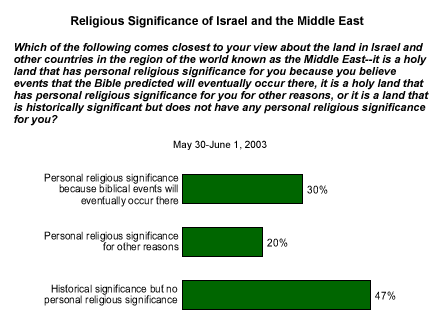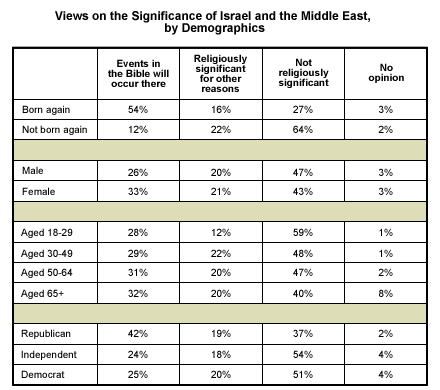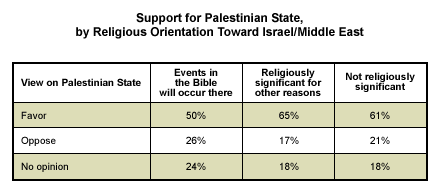The Middle East "road map to peace" is a diplomatic framework for resolving the Palestinian-Israeli conflict via mutual compromises that build toward an independent Palestinian state by 2005. While settling the status of Jerusalem is reserved for the final stage of this process, Palestine would at least encompass what is now known as the West Bank and Gaza Strip.
Some of the sharpest criticism of the road map has come from conservative Christians in the United States -- the Rev. Pat Robertson and others who believe that Israel was promised to the Jewish people by God, and that in order for the second coming of Christ to occur, the land must remain in Jewish hands.
How does that perspective compare to the views of most Americans? A May 30-June 1 Gallup Poll* finds Americans divided evenly over whether they attach religious significance to the land on which Israel and other the Middle Eastern countries are situated. According to the poll, 50% consider the region holy and 47% say it is historically significant, but not holy.

Given three ways to describe their perspectives on Israel and other countries of the Middle East, 30% select the option: "it is a holy land that has personal religious significance for you because you believe events that the Bible predicted will eventually occur there." This view is most likely to be held by the 40% of Americans who describe themselves as born again -- three-fourths of those who believe that events prophesied in the Bible will take place in the Middle East describe themselves this way. Also half of this prophecy-oriented group attends church weekly (compared to 29% of the general public that does so).
For another segment of Americans, amounting to 20% of the public, the Holy Land is indeed holy, but the religious significance is related to something other than prophecy. This group is similar to the average among all Americans in terms of religious tendencies. About a third are born agains and about half attend church weekly or nearly weekly.
Close to half the public, 47%, says the land of Israel and the Middle East is historically significant, but that it has no religious significance to them personally. Naturally, those in this group are unlikely to be born again (only 23% is) or to attend church regularly.
The Demographics of Opinion
Mostly because of their greater likelihood to be born again, women are slightly more likely than men to associate religion with Israel and other countries in the Middle East, either because of biblical prophecy or other reasons: 54% of women vs. 45% of men. Also a function of religiosity differences, older Americans (52% of those 65 and older) are more inclined to consider the region a holy land than are younger Americans (40% of those 18 to 29).
A solid majority of Republicans (61%) view the region in religious terms; a little more than half of independents (54%) and Democrats (51%) do not.

Is Robertson Mainstream?
So how does the prominent opposition of the Christian conservative movement to the Middle East road map relate to Americans' support for an independent Palestinian state?
In fact, there is little direct relation between these two sets of views. Half or more of those holding each of the three perspectives on Israel favor the creation of an independent Palestine, including: 50% of those saying the region is religiously significant because events prophesied in the Bible will eventually occur there; 61% of those who consider the region historically significant, but not religiously significant; and 65% of those who say the region is religiously significant for reasons other than prophecy.

Gallup Polls have consistently shown that while American sympathies in the decades-old dispute tend to lie much more with the Israelis than the Palestinians, most -- even conservative Christians -- favor the establishment of an independent Palestine, especially under the right conditions.
- The 2003 poll found 58% of Americans generally in favor of the establishment of a Palestinian state on the West Bank and Gaza. This included 53% of those who say they are born again, and 63% of those not identifying as born again.
- A 2002 Gallup Poll found 74% of Americans in favor of establishing a Palestinian state "if the Palestinian government demonstrates that it can end the suicide bombings in Israel."
Altogether, only 6% of U.S. adults match the Robertson profile: born again, consider Israel a holy land based on biblical prophecy, and oppose the creation of a Palestinian state.
Bottom Line
According to the American Israel Public Affairs Committee, Israeli Prime Minister Ariel Sharon has endorsed the two-state solution as a way to end the violence crippling his country, and the region. AIPAC reports that in late May, Sharon "bluntly told members of his own party -- including his sharpest critics -- that despite his own personal deep attachment to Israel's biblical and historic heartland, he believes that the current situation is bad for Palestinians and Israelis alike and reiterated his support for a Palestinian state."
Although many Americans are born-again Christians and perceive Israel in religious terms, most seem more inclined to agree with Sharon's pragmatic approach to resolving the conflict, rather than Robertson's outlook.
*Results are based on telephone interviews with 1,019 national adults, aged 18+, conducted May 30-June 1, 2003. For results based on the total sample of national adults, one can say with 95% confidence that the margin of sampling error is ±3 percentage points.
